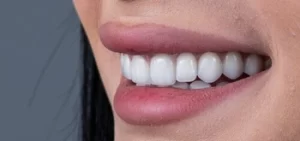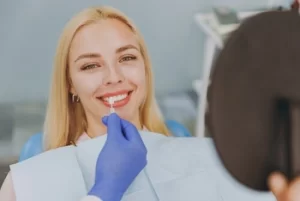Many people consider teeth whitening treatments to refresh their smiles and boost their confidence. However, the process is not as straightforward if you already have dental veneers. Understanding how teeth whitening on veneers works and what your options are will help you make an informed decision about improving your smile without compromising the quality or appearance of your restorations.
Can You Whiten Veneers Like Natural Teeth?
The short answer is no. Porcelain and composite veneers react differently to conventional whitening methods compared to natural teeth. Natural enamel is porous, meaning bleaching agents can penetrate and break down stains. Veneers, on the other hand, are non-porous custom-made shells designed to resist stains and maintain their colour over time. This means professional teeth whitening treatments will not change the shade of your veneers.
Why Veneers Don’t React to Whitening
 Porcelain or composite veneers are created from durable materials, such as porcelain or composite resin. These materials are stain-resistant and built to mimic the appearance of natural teeth while remaining unaffected by most whitening products. Because they do not absorb bleaching agents, the results you get from a whitening treatment will only affect your natural teeth, potentially leading to a mismatch in colour between your veneers and surrounding teeth.
Porcelain or composite veneers are created from durable materials, such as porcelain or composite resin. These materials are stain-resistant and built to mimic the appearance of natural teeth while remaining unaffected by most whitening products. Because they do not absorb bleaching agents, the results you get from a whitening treatment will only affect your natural teeth, potentially leading to a mismatch in colour between your veneers and surrounding teeth.
Common Causes of Stained Veneers
Although veneers are designed to resist staining, they are not completely immune to discolouration over time. Surface stains can still develop from certain habits and lifestyle choices. Some of the most common causes include:
- Consuming colour-saturated foods and drinks like coffee, tea, and red wine
- Using tobacco products, which can lead to stubborn stains
- Inadequate oral hygiene, which allows plaque and surface stains to accumulate
- Ageing veneers, especially composite resin veneers, which can become dull or stained as the surface wears down
By identifying and managing these habits, you can help maintain the appearance of your dental veneers and prevent the need for frequent veneer replacement.
Options for Refreshing Your Veneers
While traditional whitening treatments cannot whiten veneers, there are still effective ways to restore their brightness and achieve your desired look.
 1. Professional Cleaning
1. Professional Cleaning
A dental professional can carry out a thorough cleaning to eliminate surface stains and restore the polish of your veneers. This is often enough to enhance their appearance and keep them looking bright. It is recommended to schedule regular dental check ups to maintain your oral hygiene and ensure your veneers remain in excellent condition.
2. Whitening Your Natural Teeth
If your veneers remain the same shade as your natural teeth but the rest of your smile has become darker, a professional teeth whitening treatment could help restore a uniform appearance. Brightening your natural teeth can restore balance and improve the overall appearance of your smile. However, your veneers will remain the same shade, so this is best done soon after veneer placement or when discolouration is minimal.
3. Veneer Replacement
If your veneers are significantly discoloured or you are unhappy with the shade of your smile, your dentist may recommend replacing them. New veneers can be custom-made to match the colour of your whitened natural teeth, giving you a more harmonious result.
Caring for Your Veneers to Keep Them Bright
The key to maintaining the look of your veneers is prevention. Good oral hygiene habits and regular dental visits can help prolong their appearance and prevent surface stains. Here are a few tips:
- Brush your teeth at least twice a day with a non-abrasive toothpaste
- Floss each day to help stop plaque from accumulating along the edges of your veneers
- Maintain proper oral hygiene by scheduling regular dental check-ups and professional cleanings
- Steer clear of colour-saturated foods and drinks, or rinse your mouth with water after consuming them
- Avoid tobacco products, which can lead to discolouration and gum disease
- Practise regular brushing and proper dental hygiene to prevent stains and plaque buildup
 What About At-Home Whitening Treatments?
What About At-Home Whitening Treatments?
At home whitening treatments are generally ineffective for veneers and can sometimes cause damage if used incorrectly. Because veneers do not respond to bleaching agents, at home whitening treatment kits will only lighten the surrounding natural teeth. This can result in uneven colouring between your veneers and natural teeth afterwards. Always consult your dentist before trying any whitening treatment to ensure it is safe for your dental restorations.
Final Thoughts on Teeth Whitening and Veneers
Teeth whitening on veneers requires a different approach than whitening natural teeth. Since porcelain or composite materials do not react to bleaching agents, traditional whitening treatments cannot change their shade. However, professional cleaning, whitening your natural teeth, or replacing stained veneers are all effective ways to refresh your smile.
The most important step you can take is to maintain good oral hygiene and schedule regular dental check ups. By brushing your teeth regularly, avoiding stain causing foods and drinks, and seeking professional care, you can keep your veneers looking natural and preserve the bright, confident smile you desire.
For personalised advice and tailored treatment options, book a consultation with Beyond Infinity Dental at (02) 8806 3799 to discuss the most effective approach for maintaining or enhancing the appearance of your veneers.
References
Healthline. (2020, December 11). Foods that stain teeth: 9 tooth-staining foods and drinks. Retrieved from https://www.healthline.com/health/foods-that-stain-teeth
WebMD. (n.d.). Teeth whitening and bleaching. Retrieved from https://www.webmd.com/oral-health/teeth-whitening-and-bleaching
Cleveland Clinic. (2022, July 18). Veneers: What are dental veneers? Cost, procedure & advantages. Retrieved from https://my.clevelandclinic.org/health/treatments/23522-dental-veneers









